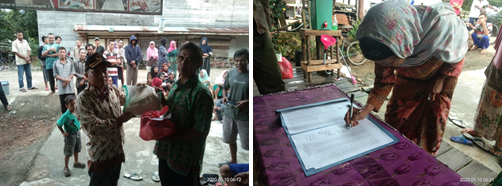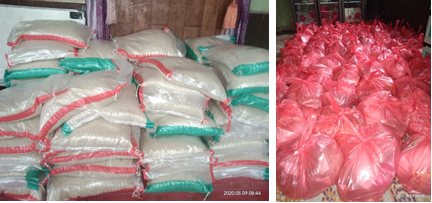
50-year-old father of two Amran* and 60-year-old widow Nur* are just two of many people working in Indonesia’s rattan industry who following the onslaught of COVID-19, have found themselves struggling to get by. Amran is a rattan harvester just like 80% of the people in his village. During normal times, he earns up to $33 a week while his wife takes in $2 per day harvesting rice. However, because of COVID-19, he has been unable to work.
“It’s been one month since I’ve gone to the forest to harvest rattan,” he says with frustration. “I usually go to the forest on a Saturday and stay there for 4-7 days until I’ve harvested enough quintals of rattan to sell to the collectors. But no collector is buying rattan anymore because they're having trouble selling it to the furniture factory.”
Even before COVID-19 hit, the price of rattan was dropping and he was forced to turn to odd-jobs to supplement his income. He spent stints cutting wood and transporting rice – anything to make some money. But now, even those income sources have dried up. The family’s sole income is the $2 his wife makes harvesting rice per day, but the rice harvesting season will come to an end in late May. The family is pinning their hope on resuming rattan harvesting in early June, but that depends on the COVID-19 situation in Indonesia.
“I’m really worried. I don’t know what we’ll do if this COVID-19 situation continues for another few months,” he frowns.
Amran and his family have already made changes to their diets to save money. They’ve cut down on meat consumption and mainly sustain themselves with rice and vegetables. The closure of his 16 and 17-year-old children’s schools means he’s been able to funnel the school fees into buying extra rice for the family, and he’s been saving on gas money as he can no longer visit his elderly parents in a nearby village.
Nur’s situation is similar. She previously earned $4.7 a day washing rattan at a rattan collection point in her village, but is now forced to harvest rice instead for a much reduced rate of $1.7 a day. She has two grown-up sons and two grandchildren who are unable to support her financially because they too have been affected by COVID-19’s impact on the rattan sector.
“We’ve had to reduce our food intake and variety during this pandemic,” she says. “Our priority is to buy rice and sugar. Before, we’d eat meat, chicken or fish at least once a week but that’s not possible anymore. We now get by solely on tempeh and vegetables, which is cheap.”
Although her village did provide some COVID-19 support in the form of free face masks and setting up public hand-washing spots, she is deeply worried about the future, especially once the rice harvesting season ends.
In 2019, The Centre (formerly CCR CSR) visited major rattan producing regions in Indonesia to conduct a child rights risk and impact assessment in the region for an international client. During that initiative, we went to Ketab Village, home to Amran and Nur, in Central Kalimantan to speak to the villagers about their experiences working in the rattan sector. Deeply worried about the bleak situation there following the COVID-19 outbreak, we recently reached out to Ketab villagers again and spoke to a number of rattan workers including Amran and Nur. These calls prompted us to deliver food packages to help ease their pressure and worry during these trying times. In May, 70 rattan farmers in total received a package consisting of rice, sugar and cooking oil – foods that while basic, will go a long way in supporting them.
While we are glad we could provide some relief to this particular group of workers, the story described here is not a positive one. Worldwide, millions of worker in the formal and informal sector, who are the backbone of our supply chains, are now bearing the brunt of the economic downturn, because we have not been able to create more sustainable and fair supply chains.
As long as workers make so little money that they only barely manage to get by during the best of times, and are not provided with social security, such as unemployment and medical insurances, any disruption will immediately create an existential crisis for them. As such, more than anything, this pandemic shows that we all need to work harder to create sustainable supply chains, where even the lowest paid workers can create a certain level of financial security that is strong enough to withhold a crisis and to guarantee their and their families’ wellbeing.

Villagers collecting and signing for the support package

The basic food supplies provided for the community of rattan harvesters
2025/12/16
Webinar: Addressing Child Labour in Complex Upstream Supply Chains: Agriculture, Mining and TextilesBy using this website, you agree to our use of cookies. We use cookies to provide you with a great experience and to help our website run effectively.